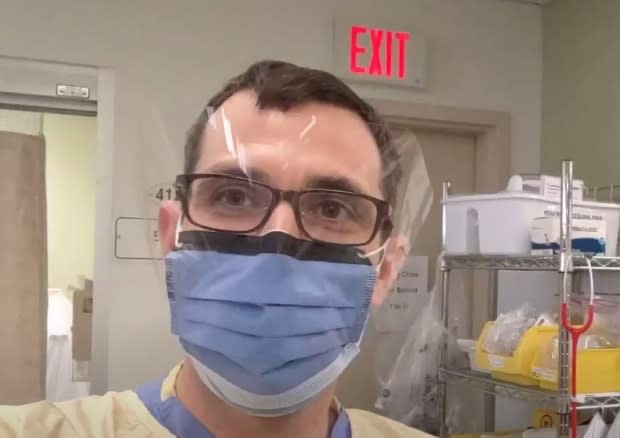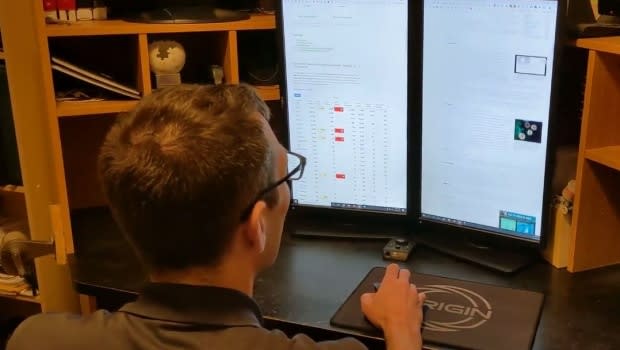Sask. doctor keeps COVID-19 Wikipedia info accurate with encyclopedic dedication
Wikipedia has been a go-to site for medical information during the COVID-19 pandemic, getting more than 10 million hits per day from people seeking medical content including information on the novel coronavirus.
And while you are clicking on the site looking for the latest COVID-19 information, a Saskatchewan-born and educated doctor is one of the people on the other side of the site, ensuring that the information you see is indeed accurate.
Dr. James Heilman is that Wikipedian. When he's not editing the site, he is also the head of the emergency department at the East Kootenay Regional Hospital in Cranbrook, B.C.
"There's a whole number of layers of quality assurance," Heilman told CBC Radio's The Afternoon Edition, but added, "If you are making an important decision, I wouldn't base it 100 per cent on what you read on Wikipedia's pages."
Heilman said the very first entry about this current pandemic showed up as a single sentence on Jan. 6 this year. There were only 44 cases recorded at the time; now there are more than 8.5 million cases in the world, and counting.
Wikipedia's COVID-19 content has grown rapidly and since that first entry, about 58,000 people have made more than 700,000 edits in the topic area. The COVID-19 information also exists in 175 languages.
Heilman said when there are issues with Wikipedia, "it's often that information is missing or at times, out of date."
When it comes to COVID-19, Wikipedia prioritizes information from reputable sources such as the Centers for Disease Control and Prevention and Health Canada, according to Heilman.
Heilman was born near Cochin, Sask., a resort village 153 kilometres northwest of Saskatoon, and is a graduate from the University of Saskatchewan's School of Medicine.
His relationship with Wikipedia began one quiet night in the emergency room about 13 years ago: Heilman was looking at a page that had a few minor issues.
"Then I noticed an edit button, and I hit that edit button, and I realized I could fix the internet," said Heilman. "That's what roped me in — and I've been trying to fix the internet ever since."
For the past year, Heilman says he puts in about 20 hours a week on Wikipedia content. It's also a fraction of what he has done in the past.

He has, at times, dedicated as many as 60 hours per week to Wikipedia. At one point a few years ago, he reduced his time working in the emergency room so that he could spend more time doing his Wikipedia work.
Heilman likes the encyclopedia of the internet because it shows the origin of every article and every change made along the way.
Because anyone can contribute to Wikipedia and initially anyone can edit the pages on the site, some people criticize its accuracy. Heilman says that Wikipedia is actually pretty accurate. Regardless, his advice is to double check and verify for yourself.
Heilman would give the same recommendation for any source because anything you find on the internet can potentially contain errors. Heilman points out that content on Facebook, YouTube and Twitter are often plagued with errors, far more so than Wikipedia.

One of the reasons he is so passionate about the site is its usefulness which allows it to help people, even those without internet access. Heilman works with others to package Wikipedia content into offline mobile apps for those in remote places.
"This way, people can download all of Wikipedia's medical content when they have access to the internet and then when they return to their communities, where there is no access, they can still browse that content because it's downloaded on their phone."
One of the most far reaching projects he's collaborating on is called "Internet in a Box." Heilman downloads all of Wikipedia's content onto miniature computers and then he mails the small computers to places around the world, where the internet doesn't exist or where there is little internet access.
"I've sent these computers to Papua New Guinea, Uruguay, Argentina, Cuba. I even sent some to Puerto Rico when they were struggling after the hurricane when the power and electricity went down," he said.
Heilman said he's shipped some to nursing schools, small medical clinics and libraries in far flung places, always with the hope to give people access to information.


